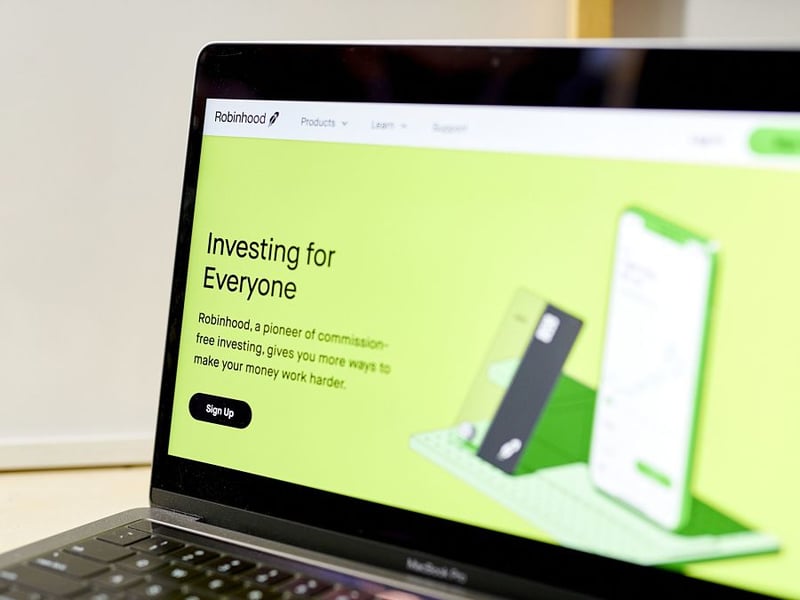

Robinhood Markets has plenty of reasons not to go public.
There’s the worry that the exuberant small-time investors who flocked to the online brokerage won’t stick around for the long haul. Or that trading in Dogecoin, which started as a joke, accounted for more than a third of its cryptocurrency revenue in the first quarter. Or that just this week, a Wall Street watchdog levied a record $70 million penalty against the firm.
Yet the company that introduced an army of young traders to the ins-and-outs of investing is still seizing its moment, filing for an initial public offering Thursday to become one of the year’s most high-profile listings. Leaning into its cult status among novice investors, Robinhood is reserving 20% to 35% of the IPO for its own retail customers -- even as it acknowledges the risk that doing so could make its shares trade like the meme stocks that helped fuel its ascent.
Robinhood revealed just how much it gained from a freshly galvanized movement of retail traders who rushed headlong into markets starting last year. The Menlo Park, California-based firm has about 18 million active users, and its revenue more than tripled to $959 million in 2020 from a year earlier.
Still the filing also showed how the brokerage is straining under the weight of that rapid growth, with its technology faltering at key moments and its customer support team scrambling to bulk up. The breakneck expansion may not be sustainable, Robinhood said. What’s more, the unusually high percentage of shares it will set aside for retail investors could cause its stock to rise to unsustainable levels -- a scenario akin to the rally in shares of GameStop Corp. and other meme stocks in late January.
The brokerage has a thicket of legal challenges to navigate, even after resolving two of them recently, including this week’s settlement with the Financial Industry Regulatory Authority Inc. and an earlier agreement with the family of a young trader who killed himself after misunderstanding his account balance.
Other legal threats loom. Robinhood disclosedthat it will need to pay a fine for allegedly violating New York state anti-money laundering and banking requirements and appoint a monitor. The U.S. Attorney’s Office for the Northern District of California also demanded access to Chief Executive Vlad Tenev’s cell phone this year.
Lawmakers and regulators are also examining certain parts of Robinhood’s business. The increased attention on game-like features in trading apps could expose the firm to risk, according to the filing, and new Securities and Exchange Commission Chairman Gary Gensler has expressed concerns about them.
Robinhood’s main revenue stream may be vulnerable as well. The brokerage receives payments from trading firms such as Citadel Securities, in return for sending them customer orders for execution, a controversial but common practice that Gensler has said raises conflict-of-interest questions.
Last year, Robinhood brought in former SEC commissioner Dan Gallagher as chief legal officer. He earned about $30 million in 2020, mostly in stock that he’ll collect in coming years, according to the filing.
Since its founding in 2013 by Stanford University alumni Tenev, 34, and Baiju Bhatt, 36, Robinhood has zeroed in on the small-dollar investors who other brokerages ignored, with its commitment to commission-free trades, no account minimums and user-friendly design.
Cultivating those kinds of customers, some of whom document their gains and losses on social-media platforms including Reddit and TikTok, proved to be a winning strategy, particularly in the past year.
The filing captured how the newer wave of customers has bolstered revenue. Those who signed up in 2020 generated $326 million that year, while users who joined in 2019 contributed just $175 million last year. All told, the company turned a net $7.45 million profit in 2020, compared with a net loss of $106.6 million a year earlier.

Futures indicate stocks will build on Tuesday's rally.

Cost of living still tops concerns about negative impacts on personal finances

Financial advisors remain vital allies even as DIY investing grows

A trade deal would mean significant cut in tariffs but 'it wont be zero'.

Inflation, economic risk is greater than previously thought.
RIAs face rising regulatory pressure in 2025. Forward-looking firms are responding with embedded technology, not more paperwork.
As inheritances are set to reshape client portfolios and next-gen heirs demand digital-first experiences, firms are retooling their wealth tech stacks and succession models in real time.
